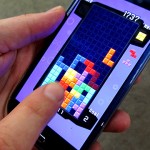 Earlier this year I looked at a new mobile game called the Triangle of Life game that was developed by students from Carnegie Mellon University.
Earlier this year I looked at a new mobile game called the Triangle of Life game that was developed by students from Carnegie Mellon University.
The app, which was developed in conjunction with the mental health organization Allegheny Health Network, gamifies the recovery of each young patient by giving them a chance to put into practice the life skills they’ve learned through their work with therapists outside of those official sessions.
Using games to offset trauma
A recent study by a team of UK academics explored whether games can play a similarly vital role for professionals who are frequently exposed to trauma.
The researchers wanted to test whether games could help reduce the potential for post-traumatic stress disorder (PTSD) amongst emergency workers.
Studies have suggested that PTSD is roughly 3 times as high in first responders as it is in the general population, so any measures that can reduce that can only be positive.
Their theory was that a quick blast of Tetris could help distract people long enough that the traumatic memories don’t flash back later on.
Blocking bad memories
Participants in the study were first primed to feel distressed by being shown clips from public safety videos. They were then invited back the following day for those memories to be reactivated via still images from the clips.
The group was then split in two, with one half playing Tetris for a few minutes, whilst the other sat quietly.
Over the following week, it emerged that the game playing group had around half as many unwanted memories as the silent group.
Now, you might think that it was merely the fact that the person was distracted from the trauma by the game, but the researchers suggest it is actually because Tetris consumes our visual processing capacity, which thus leaves little room for it to process the trauma.
It’s believed to take around six hours for memories to cement themselves in our brain, so the key is to play a game as quickly after traumatic memories are re-activated as possible.
At this stage the researchers aren’t sure how long the ‘distraction’ lasts for, nor whether other forms of distraction may be equally effective.
The approach is being tested out on emergency services staff in the UK, with first responders attempting to ‘update their memories’ before they go home after an event.
It’s certainly an interesting approach, and whilst it needs further investigation before firm conclusions can be drawn, it is something that appears to warrant further exploration.
This makes a lot of sense as it must help you to unwind after a difficult day.
Tetris is a happy memory for me.
I love zoning out with Tetris on my phone for a few minutes! Like a brain break.
I suffer PTSD from a really bad car crash, I was trapped in a severely crushed car and needed to be cut free. I did have major issues for years but playing computer games helped and for some reason I found games like call of duty helped as it released any anger, Strange I know but it worked for me and was better than all the Councillors who just told me to think happy thought and breath deeply.
If they'd allowed the test participants to play Tetris for just 5 more minutes, they would've seen the violent outbursts: "ANOTHER DAMNED SQUARE?!"